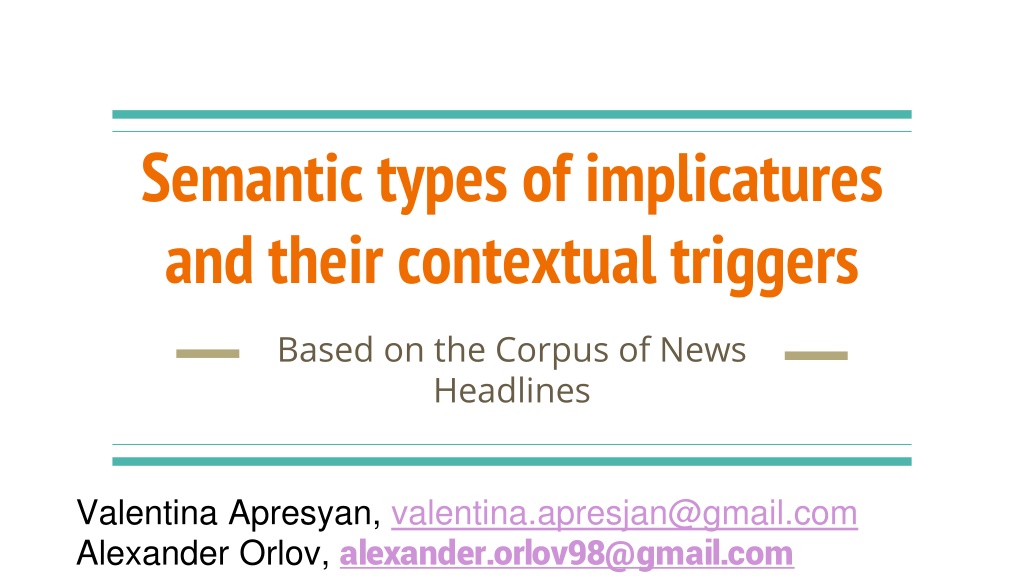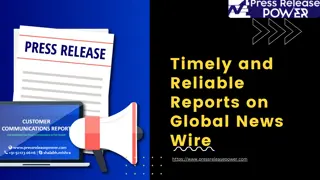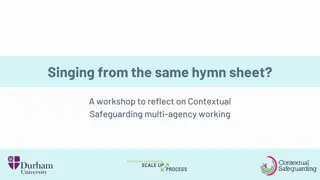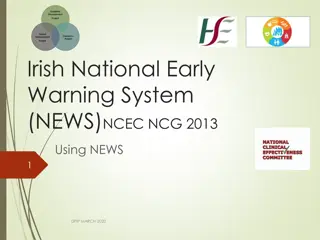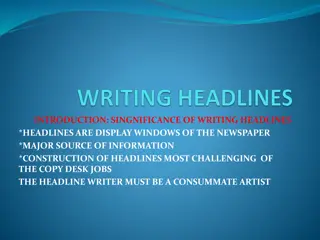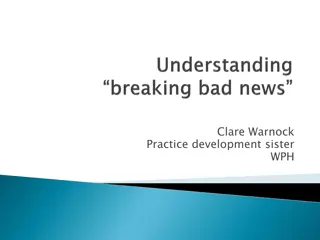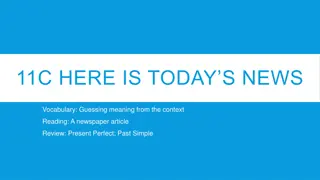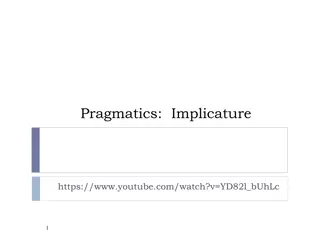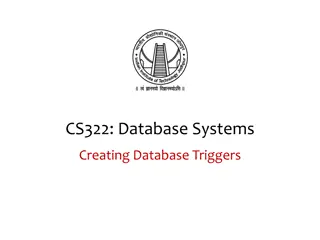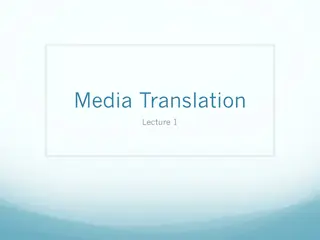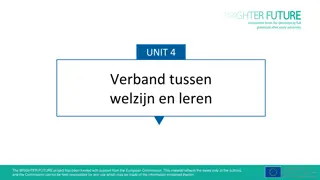Understanding Implicatures: Types and Contextual Triggers in News Headlines
Implicatures are implied meanings that are not explicitly stated, with cancellable nature, in linguistic expressions. This article explores different types of implicatures and their triggers in news headlines, discussing conversational vs. conventional implicatures, terminological debates, and the distinction between implicatures and explicatures. Examples and criticisms are provided to enhance comprehension of how implicatures function in communication.
Download Presentation

Please find below an Image/Link to download the presentation.
The content on the website is provided AS IS for your information and personal use only. It may not be sold, licensed, or shared on other websites without obtaining consent from the author. Download presentation by click this link. If you encounter any issues during the download, it is possible that the publisher has removed the file from their server.
E N D
Presentation Transcript
Semantic types of implicatures and their contextual triggers Based on the Corpus of News Headlines Valentina Apresyan, valentina.apresjan@gmail.com Alexander Orlov, alexander.orlov98@gmail.com
Objectives Contribute to the semantic typology of implicatures Establish contextual triggers for different implicature types
What is an implicature? By implicatures we understand meanings that are implied, but not literally stated, in the utterance, and that are cancellable (P. Grice, 1975) (1) This cake looks delicious implies I want to have some However, we can cancel the implicature: (2) This cake looks delicious, but I am off sugar, so I can t have any
Terminological debate Conversational vs. conventional implicatures (P. Grice, 1975): (1)It is raining (conversational implicature Take the umbrella or We cannot go for a walk or Finally the drought is over ) (2)John is poor but happy (conventional implicature Poverty usually contradicts happiness ) Criticism: Conventional implicatures are entailments (Potts 1999) or presuppositions
Terminological debate: Implicatures vs. Explicatures (Carston 2002) Explicatures are communicated assumptions that are developed by supplying additional information from the context, e.g. by assigning referents to pronouns: (1)Susanicomplained that herikiwis were too sour (explicature: kiwis that Susan grew ) All assumptions that cannot be obtained in this way are implicatures
Our understanding of implicature Any cancellable implied meanings in the utterance, whether they are context-dependent or triggered by a specific word are implicatures: (1)I congratulated the winner (implicature: on her victory ) (2)I congratulated the winner on her 20th wedding anniversary (3)She has style (implicature: her style is good ) (4)She has bad style
Assertion, presupposition, implicature: a scale (1) Putin and Trump didn t meet (assertion there was no meeting , explicit) (2) Why didn t Putin and Trump meet? (presupposition there was no meeting , implicit, not cancellable) (3) Trump cancelled his meeting with Putin (implicature there was not meeting , implicit, cancellable) (4) Trump cancelled his meeting with Putin but later they met
Our material: Corpus of Newspaper Headlines More than 700 headlines from 14 Russian Internet-newspapers Around 30% of the headlines in the corpus are misleading relative to the content of the article, in order to attract attention Numerous devices of misleading, including implicatures
False implicature Russia is ready for the Internet cut-off , 05.03.2018 Expectation from the article: The Internet cut-off is impending Real content: Russia is sufficiently advanced technologically and will be able to function properly in case of a global Internet shut- down
Implicature triggered by ready A2 is ready for A2 A person or an object A1 has everything necessary to act and function successfully in a situation A2 (Glovinskaja 2014) (1) , Russia is ready for Internet cut-off, but at the moment there is no plan to disconnect the country from the Internet
Html - marking <implicative> </implicative> Russia is <implicative>ready for</implicative> the Internet cut-off
Misleading headlines. Device: de re instead of de dicto They will stop selling table salt in Russia https://mir24.tv/news/16321700/v-rossii-perestanut-prodavat-povarennuyu-sol Expectation from the article: A ban will be imposed on selling salt in Russia. Real content: The product will change its name. According to a new law, salt that is sold in the shops, will be called edible salt, not table salt.
Misleading headlines. Device: Omission Syrian rebels laid down their arms https://lenta.ru/news/2018/07/07/deraa/ Expectation from the article: All Syrian rebels stopped fighting. The war is over. Real content: Syrians rebels in Daraa province stopped fighting.
What is the practical use of the corpus? The programs aimed at detecting misleading headlines are currently developed by (Anand et al. 2016), (Wei, Wan 2017). Taking linguistic data into account can enhance the performance of the programs.
Full list of manipulative devices in CNH False presupposition Syntactic homonymy Semantic homonymy Semantic shift Metonymy Hyperbole Omission De re vs. de dicto False implicature (3d most frequent device) Wrong modality Wrong topic
False implicatures: typical target audience The newspapers targeting well-educated young people tend to use false implicatures more frequently The use of this device does not depend on media s political orientation Percentage of misleading headlines created via false implicature Less educated audience More educated audience ? Lenta.ru - 20% Liberal - 7% - 16% Conservative
Why do we study implicature types and triggers through false implicatures in CNH? The mechanisms of implicatures in headlines and elsewhere are the same, but false implicatures are more typical of headlines than other forms of discourse False implicatures are more noticeable, hence the contexts are easier to understand and describe
Semantic types of implicatures encountered in CNH Causal implicatures (Counter)factive implicatures Qualitative implicatures
Causal implicatures 40 % of all false implicatures Two types
Causal implicatures triggered by unexpressed Cause argument of the predicate (1) (15.07.2018, lenta.ru) Putin presented the medal to the Croatian soccer player who shouted Glory to Ukraine (after the FIFA World Cup 2018) Implicature: The Croatian player was awarded for shouting Why? The verb to award has three semantic arguments: Agent (Awarder), Recipient (Awardee) and Cause In (1), Cause is unexpressed, hence the attributive participial construction lit.: shouting Glory to Ukraine is re-interpreted as filling the Cause argument, due to Grice s Relevance Maxim
Cancellation of the implicature In fact, the Croatian soccer player Domagoj Vida received the award from Putin (as the president of the hosting country) along with the rest of the Croatian team, for taking silver in the FIFA World Cup 2018 Additional scalar implicature: only Domagoj Vida was awarded the medal
Causal implicatures triggered by unexpressed Cause argument and value judgment in the object (1) They arrested the thief, implicature for theft (2) They rewarded the brave officer, implicature for bravery Cancellability (by the regular expression of Cause): (3) They arrested the thief for attacking the police officer (4) They rewarded the brave officer for his long and honorable service
In the absence of positive or negative value elements, the sentence sounds unfinished Unexpressed Cause argument, and no elements to interpret as Cause create the impression of incompleteness: (1) ?They arrested the man (2) ?They rewarded the blond woman
Semantic classes of predicates conducive to causal implicatures in the context of value judgment Predicates with Patient/Recipient and Cause arguments: semantics classes of pity, anger, revenge, abuse, criticism, penalty, punishment, praise, reward, and gratitude: to pity, to be sorry, to sympathize; to be angry, to rage; to take revenge, to pursue, to persecute; to scold, to reprimand, to criticize, to blame; to punish, to penalize; to praise, to compliment; to reward; to thank
Causal implicatures triggered by temporal expressions Temporals are often used in headlines for indirect expression of causal relations, as they they attenuate the more direct meaning of cause - effect; cf. the following true implicature: (1) Yulia Latynina left Russia after her car was set on fire - after = because Device beloved by lenta.ru! https://republic.ru/posts/86290
Conventional causal implicatures triggered by temporal expressions Russian temporals with causal implicatures can serve as connectors to express indirect causation: (1) /?? - /? A girl in the Moscow suburbs died after/??because of/?as a result of playing with her brother https://rg.ru/2019/01/14/reg-cfo/v-podmoskove-devochka-pogibla-posle-igry-s-bratom.html
(Counter)factual implicatures (1) Matvienko spoke about her rejection of Putin/ refusal to Putin and remembered the best years of her life https://lenta.ru/news/2019/04/07/matvienko/ Word play: refusal, rejection + a man s name is interpreted as rejection of a matrimonial offer Implicature: Refusal was final, she didn t do what was asked
Implicature cancelled by the content of the article Putin asked Matvienko to become the Governor of Saint- Petersburg, and after several refusals she did (Governor 2003-2011)
Different speech acts differ with respect to factuality Refusals contain an implicature of counterfactuality: (1)He refused to collect the unpaid bills, impl. He didn t collect (2) As she expected, he had refused to collect the unpaid bills until she prodded him into it, and then he had done it apologetically and half heartedly [Margaret Mitchell. Gone with the Wind, Part 2 (1936)], implicature cancelled
Agreements contain a weak implicature of factuality (1)The Le Cirque reservationist immediately agreed to have a table ready for Mr. Tomlinson and Irv whenever they arrived [Lauren Weisberger. The Devil Wears Prada (2003)], impl. The table will be ready when they arrive (2) He agreed to help, no implicature that he helped (3) He agrees to pay fifty-two hundred dollars a year. Suppose he doesn t pay it. Then what ? [Erle Stanley Gardner. The Case of the Blonde Bonanza (1962)], cancelled implicature
Russian vs. English agree (1) Thank you for seeing us [Dan Brown. Angels and Demons (2000)] (2) , [ . ( . , 2004)] Thank you for agreeing to see us
Perlocutionary acts (Austin 1962) Persuasions entail factiality: (1) He persuaded John to come = John came (2) *He persuaded John to come but John didn t come Dissuasions entail counterfactuality: (3) He dissuaded John from coming = John didn t come (4) *He dissuaded John from coming but John came
Qualitative implicatures - The director of the "Black Swan" spoke in Russian after the Bolshoi Theater (https://lenta.ru/news/2018/06/30/aronofsky/) Manipulative devices: homonymy ( to start saying smth. vs. to start speaking a language ); qualitative implicature ( to speak a language implies mastery); causal implicature ( after the Bolshoi Theater implies because of the visit to the Bolshoi Theater )
Canceled by the article content Aronofsky wrote a few lines in Russian in his Instagram after visiting the Bolshoi Theater
Contextual triggers of qualitative implicatures Words with the meaning of skills and competences: (1) He knows French , impl. knows well (2) He knows about cars , impl. a lot (3) He knows how to ski , impl. well (4) He knows the subject Cancellation: , , , doesn t know well
Positive implicatures are similar to Jury Apresjans weak senses (Apresjan 2009) (1) , lit.: He thinks implies He thinks well , He is smart , He thinks straight (2) He isn t smart , lit.: He thinks badly - cancelled implicature (3) He has a sense of humor, implied good sense of humor (4) He has a bad sense of humor Cf. ability, skills, taste, etc.
Resultative verbs that involve scalarity (1) He learned his part (implicature well ) (2) He learned his part badly, He barely learned his part Qualitative vs. scalar implicatures: (1) the linen dried (implicature completely/well ) (2) / the linen dried incompletely/badly (3) ( ) He threw away the garbage but not all
Profession names as triggers of positive implicatures (1) , ( . . ) I am also a performer, though bad (Ivan Turgenev) (2) * , I am also a performer, though good Creative professions carry positive implicatures: artist, painter, actor Syntactic conditions. Implicatures occur if profession name is in the predicate: The artist arrived - no implicature
Conclusion We have formulated three types of implicatures, along with their contextual triggers Different implicatures are associated with different contexts, which makes it feasible to detect them automatically These contexts can be useful in creating programs that filter misleading headlines in Russian These contexts can coincide or differ across languages
Literature Anand et al. 2016 A. Anand, T. Chakraborty, N. Park. We used neural networks to detect clickbaits: You won't believe what happened next!. arXiv preprint arXiv:1612.01340, 2016. Carston 2000 R. Carston. Explicature and semantics // Semantics: A Reader, Vol. 12. Oxford: Oxford University Press, 2000. P. 1- 44 Grice, 1975 P. Grice. Logic and conversation // P. Cole, J. Morgan (eds.). Syntax and semantics. 3: Speech acts. New York: Academic Press, 1975. Wei, Wan 2017 W. Wei, X. Wan. Learning to identify ambiguous and misleading news headlines // IJCAI'17 Proceedings of the 26th International Joint Conference on Artificial Intelligence. Melbourne, Australia, August 19- 25, 2017. AAAI Press: Melbourne, 2017. P. 4172-4178.
